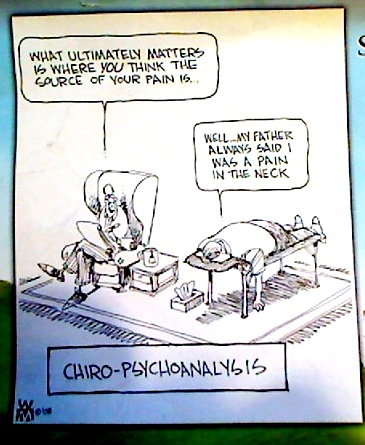 Believe it or not, the treatment of mental health problems constitutes a fair amount of my practice. People who are stuck in the chiropractor = back pain paradigm get all squinty-eyed when you bring this topic up. But the fact of the matter is that every chiropractic physician has had training in the evaluation and treatment of depression, anxiety, and other behavioral issues. It is part of our standard education. It has also been a substantive part of my postgraduate education as well.
While the squinty-eyed among us may find this hard to accept, the use of drugs to manage moderate mental health issues is (thankfully) on its way out.
Believe it or not, the treatment of mental health problems constitutes a fair amount of my practice. People who are stuck in the chiropractor = back pain paradigm get all squinty-eyed when you bring this topic up. But the fact of the matter is that every chiropractic physician has had training in the evaluation and treatment of depression, anxiety, and other behavioral issues. It is part of our standard education. It has also been a substantive part of my postgraduate education as well.
While the squinty-eyed among us may find this hard to accept, the use of drugs to manage moderate mental health issues is (thankfully) on its way out.
The first death knell in the pharmaceutical paradigm was sounded several years ago, when the American Psychological Association published a groundbreaking article, Listening to Prozac, which found that the effect of the most common type of antidepressant medications such as Prozac were largely due to the placebo effect -- that is, Prozac works only because people believed that the pills would work, because their medical doctor told them so. According to this and subsequent studies, SSRIs -- the class of drug to which Prozac belongs -- are almost next to useless.
With the pharmaceutical option on the ropes, people suffering from anxiety and depression are increasingly looking to their chiropractic physicians for relief.
And, fortunately, we have some answers.
First of all, since chiropractic doctors don't live in the pill-for-every-ill world, we're more comfortable with approaches like talk therapy. I, for one, have a ready list of therapists with a variety of skills and specialties whom I frequently turn to for co-management of these disorders.
And as you might imagine, mental health problems are no mystery to Traditional Chinese Medicine. Interestingly, TCM diagnosis and analysis of these problems is very sophisticated. Though, in the peculiar idiom and allegory of TCM, the diagnoses have some inadvertantly humorous names, such as Plum Pit Qi, Oppressive Ghost Dreams, and my all-time favorite, Running Piglets:
I'm very sorry Mrs. Jones, but you've got a bad case of running piglets!
Humor aside, through the intelligent use of acupuncture and herbs, I have been able to help many people with depression and anxiety disorders.
Another drug-free approach to mental disorders is through nutrition. Nutritional treatment for depression has made great strides since the mid-nineties, when the approach was generally to just throw St. John's Wort at the patient and call it a day.
Today, I am most likely to order a couple of laboratory tests which can tell me a great deal about the physiological origins of the patient's mental complaints. Much can be understood about the neurotransmitters and hormones that affect mood with relatively inexpensive urine and blood tests.
That information takes much of the guesswork out of treatment, and allows me to objectively measure the patient's progress.
Finally, there is the lifestyle counseling that chiropractic physicians revel in. Changing diets, changing exercise, changing habits -- all of these can greatly contribute to mental health.
So, can chiropractors help people with anxiety or depression? Indeed we can, and in this office we do so nearly every day. It is not quackery; it is solid science and clinical decision-making. And, unlike the alternative drugs, the research shows that chiropractic care for mental disorders works.